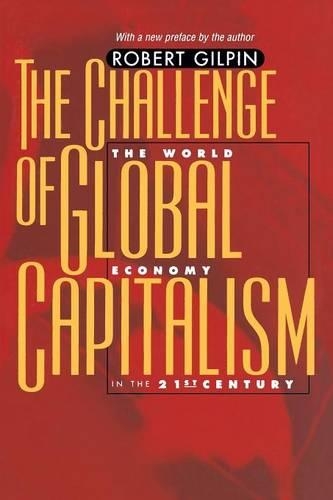
The Challenge of Global Capitalism: The World Economy in the 21st Century
(Paperback, Revised edition)
Publishing Details
The Challenge of Global Capitalism: The World Economy in the 21st Century
By (Author) Robert G. Gilpin
Princeton University Press
Princeton University Press
22nd April 2002
Revised edition
United States
Classifications
Professional and Scholarly
Non Fiction
Globalization
337
Winner of AAP/Professional and Scholarly Publishing Awards: Government and Political Science 2000
Physical Properties
Paperback
408
Width 152mm, Height 235mm
567g
Description
Many individuals proclaim that global capitalism is here to stay. Unfettered markets, they argue, now drive the world, and all countries must adjust, no matter how painful this may be for some. Robert Gilpin urges us, however, not to take an open and integrated global economy for granted. Rather, we must consider the political circumstances that have enabled global markets to function and the probability that these conditions will continue. The Challenge of Global Capitalism is a magisterial inquiry into all major aspects of the contemporary world political economy. Beginning with the 1989 end of the Cold War and the subsequent collapse of communism, it focuses on globalization and rapid technological change and covers a broad sweep of economic developments and political cultures, Gilpin demonstrates the fragility of a global and integrated economy and recommends what can be done to strengthen it.
Reviews
Winner of the 2000 Award for Best Professional/Scholarly Book in Government and Political Science, Association of American Publishers "One of the many virtues of Robert Gilpin's wide-ranging book is its deep sense of history. The Challenge of Global Capitalism is an exemplary guide to the geo-strategic environment in which world markets operate."--John Gray, Times Literary Supplement "A comprehensive take on this new world of economic conflict ... [Gilpin] understands ... that the wheels may be coming off the post-cold-war roller coaster that the United States rode to great heights in the 1990's."--David E. Sanger, The New York Times Book Review "Better than any other recent book, [this book] shows that globalization rests squarely on an aging security order binding the great powers together. If these alliances erode and are replaced with more ambiguous--and even rival--strategic relations, all bets are off ... The question that Gilpin's book brilliantly poses is whether globalization's upheaval will result in a more inclusive and responsive set of international rules and institutions or whether it signals a more dangerous breakdown."--G. John Ikenberry, Foreign Affairs "A sweeping survey of today's international economy and the tensions that are threatening and eroding its stability. Gilpin's vast knowledge of politics, economics, and technology are all convincingly on display here ..."--Ethan B. Kapstein--Civilization "This work is truly important ... for the validation it gives to criticism of the political and social consequences of global capitalism."--Virginia Quarterly Review "A masterful and original contribution to contemporary scholarly debates... Gilpin's new study could not be more timely. This sophisticated exploration of the fragility of political support for an open world economy and of the conditions that could bring the 'Second Great Age' to an end is much more than required reading for our students."--Louis W. Pauly, Journal of Politics
Author Bio
Robert Gilpin is the Eisenhower Professor of Public and International Affairs Emeritus at Princeton University. His works include Global Political Economy and The Political Economy of International Relations (both Princeton) and War and Change in World Politics.
